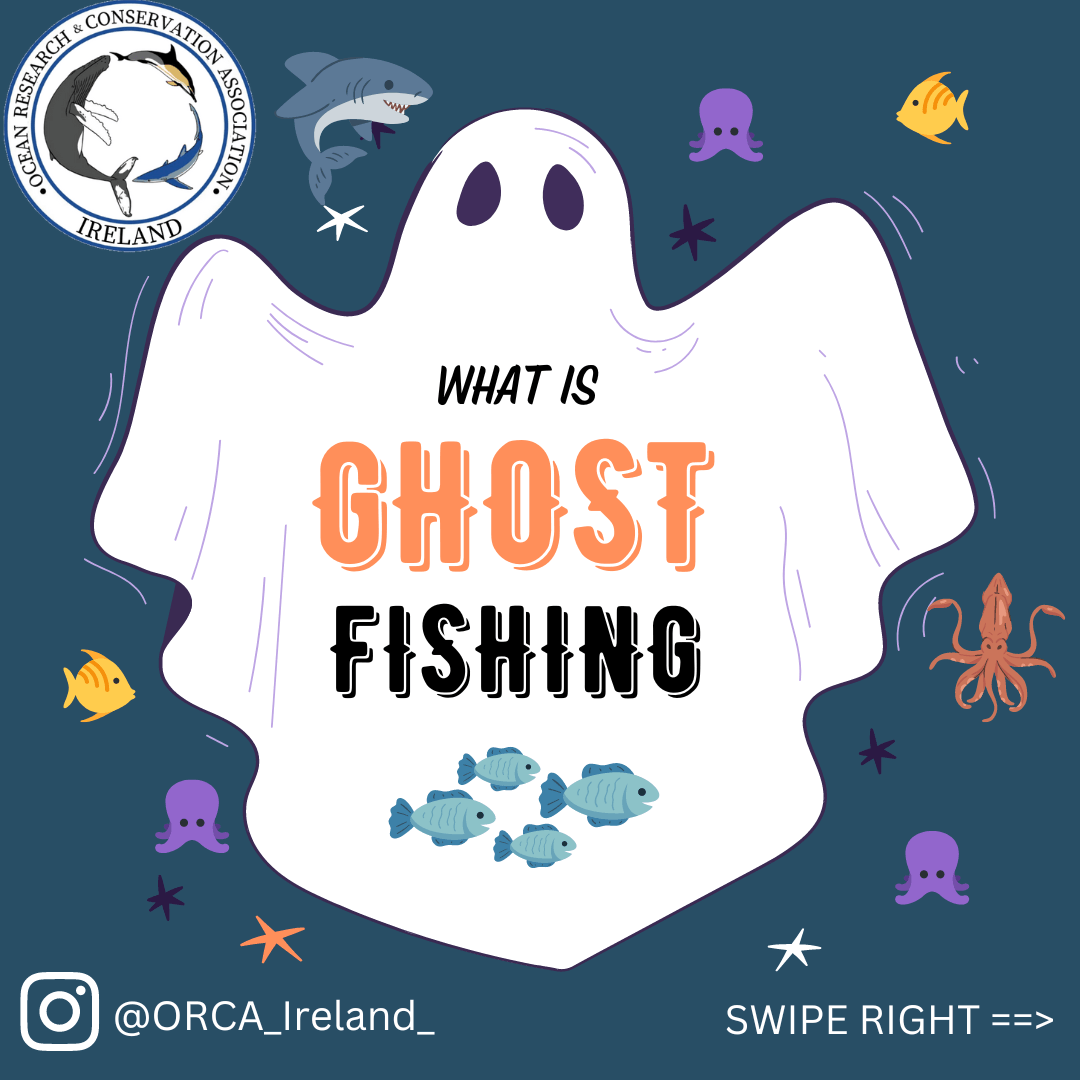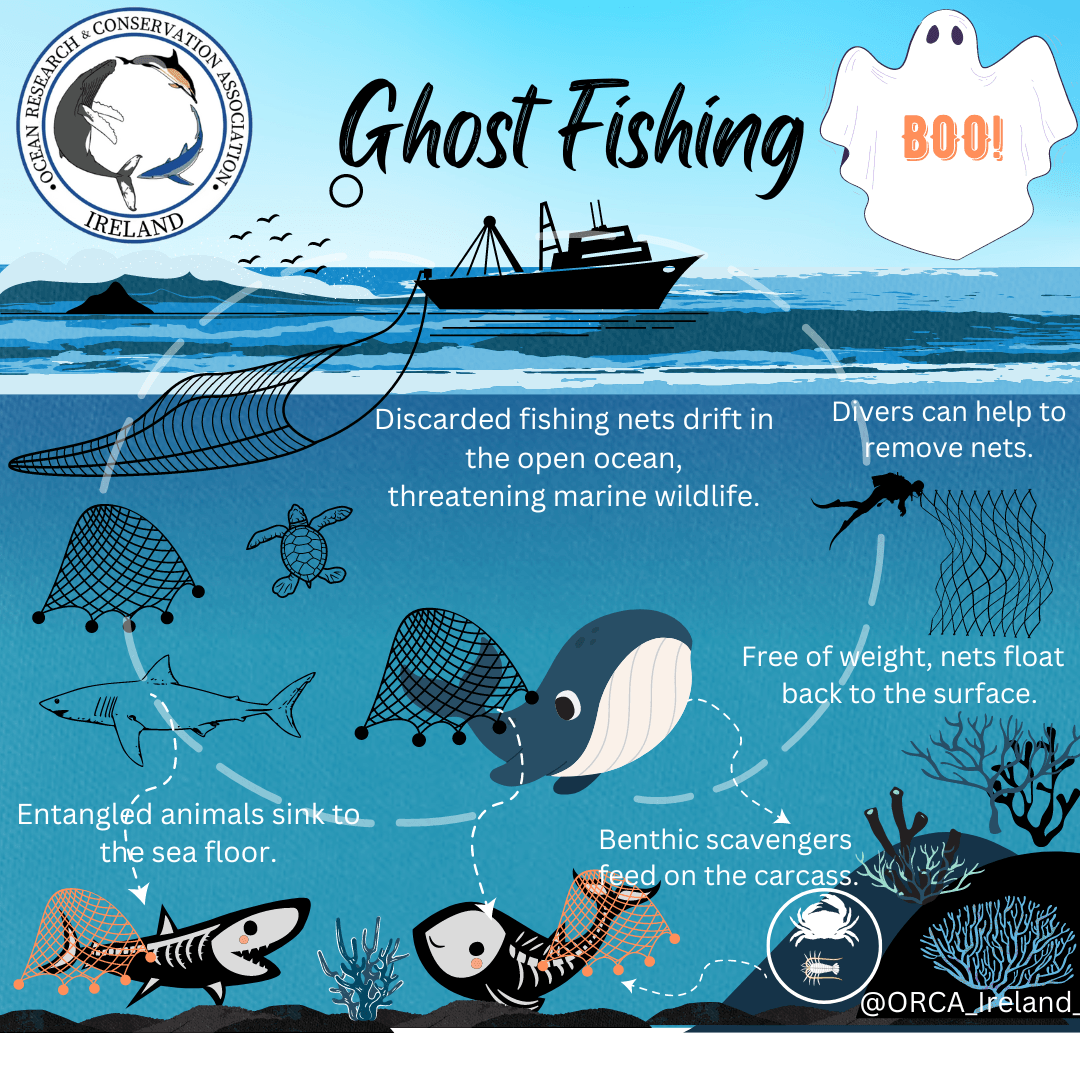Halloween Special: Ghost Gear: A True Horror Story.
GHOST GEAR: A TRUE HORROR STORY
ORCA IRELAND SCI-COMM | 31st OCT 2022
This Halloween, ORCA Ireland is featuring a true nightmare for our oceans to help raise awareness of the destructive nature of ghost fishing. Ghost fishing is the destructive process of continued catching and killing of marine animals by abandoned, lost or discarded fishing gear. This now dubbed “ghost gear” is no longer actively managed or attended to by a fishing vessel or an individual fisher. However, it remains active, continuing to catch and kill animals, non-selectively capturing everything in its path.

Entanglement in ghost gear often causes exhaustion, suffocation, starvation, amputations of limbs, and even death to marine wildlife. This is a separate issue to by-catch, which involves the accidental capture of non-targeted species by actively managed fishing gear.
Ghost fishing is responsible for the death of countless marine animals, and it is an extremely difficult mortality cause rate for scientists to estimate given the fact that animal carcasses sink to the seabed, sometimes to great depths. In addition to catching and killing marine life, ghost gear can smother and damage already sensitive habitats (such as coral reefs), facilitate the spread of invasive species, devastate shorelines and damage boats.
No matter the type of gear, ghost gear can impact various marine species when left adrift. Most fishing gear is designed to target a particular species or group of species. However, abandoned, lost or discarded gear is often far more destructive than originally intended. In fact, ghost gear actually increases its catch efficiency the longer it persists in the ocean due to the initial catch acting as bait, attracting larger fish and megafauna.

Larger predators, such as sea turtles, sharks, and dolphins are attracted to ghost nets. A ghost net can often be a number of nets that are entangled in each other. Finally, weighted down due to its catch, it sinks to the bottom of the ocean. Once on the seabed, smaller scavengers such as crustaceans and invertebrates may forage on the entangled carcass. Natural decomposition and increased scavenger foraging, reduces the weight of the net to the extent that it floats back up to the surface. The cycle of ghost fishing then beings all over again.
Unfortunately, ghost nets are also a marine pollutant. Traditionally, fishers made fishing gear from natural materials, such as cotton, hemp and coconut, that degraded overtime. Nowadays, fishing gear is made out of plastics, such as high density polyethylene and nylon.
Unless there is human intervention to remove the gear, it will likely be a mortal threat to marine wildlife for decades to come, contributing to the depletion of fish stocks around the world.
Physically removing ghost gear from the ocean, beaches and coastal areas is often extremely dangerous and difficult work. Only trained divers should attempt to remove a ghost net as conglomerates can often weighs hundreds of kilos. Removal is often only possible by either cutting it into manageable pieces or by using heavy machinery.
While removing ghost gear and safely disposing of it is important to end the destruction of the ghost fishing cycle, that is only a short-term and limited solution. The long-term most viable solution is to prevent fishing gear from becoming ghost gear in the first instance.
REFERENCE:
O’Hanlon, N.J., Bond, A.L., Lavers, J.L., Masden, E.A. and James, N.A., 2019. Monitoring nest incorporation of anthropogenic debris by Northern Gannets across their range. Environmental Pollution, 255, p.113152.
SHARE THIS ARTICLE













